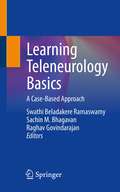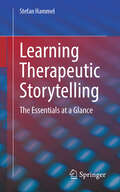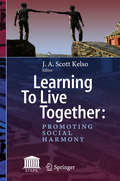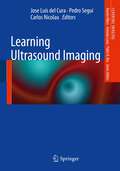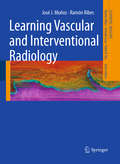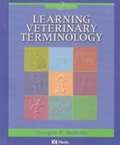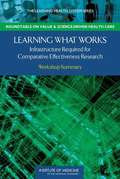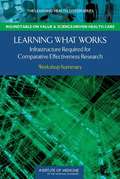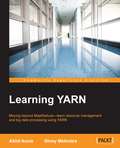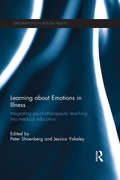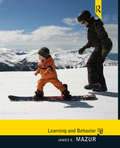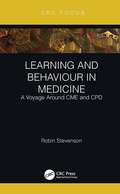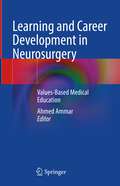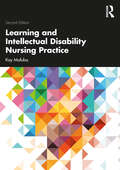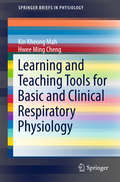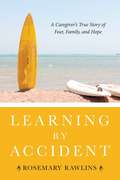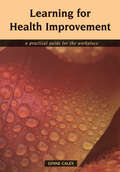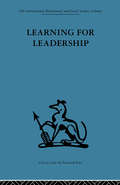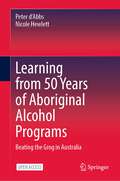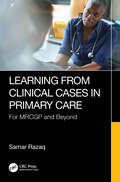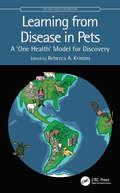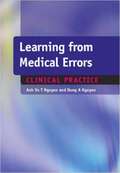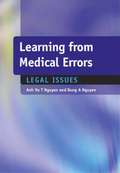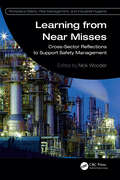- Table View
- List View
Learning Teleneurology Basics: A Case-Based Approach
by Raghav Govindarajan Sachin M. Bhagavan Swathi Beladakere RamaswamyThis book focuses on the basics of teleneurology and provides an outline of curriculum and practice with the help of clinical vignettes. It fills the gap for a text that reflects the rapidly evolving nature of the teleneurology field, with specific attention paid to examining how this can be extended to patient treatment. Recent COVID-19 pandemic rapidly revolutionized telemedicine technology and reformed the practice of medicine; this book will serve as an easy guide to physicians all over the world to adapt to changing needs of the health care system. Concise and comprehensive, this 12 chapter book covers a variety of neurological disorders and highlights specific aspects of teleneurology practice, including medicolegal issues, licensure, standard of care, ethical issues, and future trends. Designed to be a resource for students and residents, as well as medical school faculty and practicing clinicians, Learning Teleneurology Basics will prepare the reader to deliver care remotely.
Learning Therapeutic Storytelling: The Essentials at a Glance
by Stefan HammelThe book provides a hypnosystemically grounded introduction to therapeutic storytelling in medicine, child therapy, adult psychotherapy, couples therapy, family therapy, social work, pastoral care, education, coaching, supervision, and related professional fields.Contents include:The relevance of storytelling to therapy.Why, when, and how stories have therapeutic effects.Where I can use therapeutic stories.How to find the right story for the right moment.Structuring a therapeutic story.How to start and continue.Enhancing narrative skills.About the Author:Stefan Hammel works as a systemic therapist, hypnotherapist, and author. He is also an protestant hospital and psychiatric chaplain, as well as the director of the Institute for Hypnosystemic Counseling in Kaiserslautern. Additionally, he serves as a lecturer for systemic and hypnotherapeutic training institutes in Germany, Austria, and Switzerland. He conducts seminars on Ericksonian hypnotherapy, therapeutic storytelling, systemic and hypnosystemic counseling. His main areas of focus include couple and family therapy, therapy for children and adolescents, depression, anxiety, trauma, end-of-life and grief counseling, as well as supporting somatic healing processes.
Learning To Live Together: Promoting Social Harmony
by J. A. Scott KelsoThis book is devoted to the issue of how we can learn to live together in the face of division and conflict. It is dedicated to the life and work of a remarkable human being, Dr Epimenidis Haidemenakis, scientist, statesman, visionary leader, President Emeritus of the International S.T.E.P.S. Foundation and founding father of The Olympiads of the Mind (OM). The monograph consists of a collection of papers presented at the 8th and 9th Olympiads of the Mind held in Washington, DC and Chania, Crete respectively. Distinguished international scholars, government and corporate representatives, leading researchers and academics from multiple disciplines and Nobel Laureates Leon Lederman (Physics, 1988), Martin Perl (Physics, 1995) and Yuan T. Lee (Chemistry, 1986) address a broad range of issues all with the aim of improving the human condition and achieving cooperation among the people of the world. The topics include the environment, sustainability and security; diversity and how to achieve integration and peace among people in a fractured world; the important role of brain research; how to overcome poverty and inequality; how to enhance creativity and improve education at all levels; and how new technologies and tools can be used for common benefit. The culmination of the book is a call to action, to join what one might call the “OM Movement”—bringing the best minds in the world together to create solutions to world issues so that we can all live together in harmony.
Learning Ultrasound Imaging
by Carlos Nicolau Jose Luís del Cura Pedro SeguíThis book offers a practical approach to the world of diagnostic ultrasound. It has been structured in a reader-friendly, case-based format that makes it easy and enjoyable to learn the basics of the applications and interpretation of ultrasound. Each case includes illustrations, descriptions of the imaging findings, and technical details and serves to identify the essential imaging features of the pathology under consideration, thus assisting the reader in the diagnosis of similar cases. The book is divided into 17 short chapters that review the most important areas of ultrasound application and also document the latest advances in the use of contrast and interventional ultrasound. The authors treat every topic from a "how to do it" perspective with the aim of imparting their wide experience in use of the technique. This book forms part of the Learning Imaging series for medical students, residents, less experienced radiologists, and other medical staff.
Learning Vascular and Interventional Radiology
by Ramón Ribes José J. MuñozThis book is an introduction to interventional radiology. Written in a case-based format, the book is subdivided into ten chapters made up of ten vascular and non-vascular interventional radiology cases.Each case contains illustrations and legends describing the imaging findings and technical details of each intervention, comments from anatomical, physiopathological and radiological standpoints, as well as a description of the interventional procedure and the required interventional devices.The book is aimed at vascular and non-vascular interventional radiologists, vascular surgeons, radiology residents, vascular surgery residents, nurses and radiology technicians.
Learning Veterinary Terminology (Second Edition)
by Douglas F. McbrideThis text is newly updated to reflect the latest terminology and features numerous new and revised pedagogical features that make it an excellent resource both in the classroom and for self-study. Brand-new additions include several new appendices, new anatomical drawings, and a more extensive index. Many sections have been completely rewritten for consistency and greater reader comprehension, and review sections now include more thought-provoking questions and multiple-choice tests.
Learning What Works
by Claudia GrossmanIt is essential for patients and clinicians to have the resources needed to make informed, collaborative care decisions. Despite this need, only a small fraction of health-related expenditures in the United States have been devoted to comparative effectiveness research (CER). To improve the effectiveness and value of the care delivered, the nation needs to build its capacity for ongoing study and monitoring of the relative effectiveness of clinical interventions and care processes through expanded trials and studies, systematic reviews, innovative research strategies, and clinical registries, as well as improving its ability to apply what is learned from such study through the translation and provision of information and decision support. As part of its Learning Health System series of workshops, the Institute of Medicine's (IOM's) Roundtable on Value & Science-Driven Health Care hosted a workshop to discuss capacity priorities to build the evidence base necessary for care that is more effective and delivers higher value for patients. Learning What Works summarizes the proceedings of the seventh workshop in the Learning Health System series. This workshop focused on the infrastructure needs--including methods, coordination capacities, data resources and linkages, and workforce--for developing an expanded and efficient national capacity for CER. Learning What Works also assesses the current and needed capacity to expand and improve this work, and identifies priority next steps. Learning What Works is a valuable resource for health care professionals, as well as health care policy makers.
Learning What Works
by The Learning Health System SeriesIt is essential for patients and clinicians to have the resources needed to make informed, collaborative care decisions. Despite this need, only a small fraction of health-related expenditures in the United States have been devoted to comparative effectiveness research (CER). To improve the effectiveness and value of the care delivered, the nation needs to build its capacity for ongoing study and monitoring of the relative effectiveness of clinical interventions and care processes through expanded trials and studies, systematic reviews, innovative research strategies, and clinical registries, as well as improving its ability to apply what is learned from such study through the translation and provision of information and decision support. As part of its Learning Health System series of workshops, the Institute of Medicine's (IOM's) Roundtable on Value & Science-Driven Health Care hosted a workshop to discuss capacity priorities to build the evidence base necessary for care that is more effective and delivers higher value for patients. Learning What Works summarizes the proceedings of the seventh workshop in the Learning Health System series. This workshop focused on the infrastructure needs--including methods, coordination capacities, data resources and linkages, and workforce--for developing an expanded and efficient national capacity for CER. Learning What Works also assesses the current and needed capacity to expand and improve this work, and identifies priority next steps. Learning What Works is a valuable resource for health care professionals, as well as health care policy makers.
Learning What Works: Workshop Summary
by J. Michael Mcginnis Leighanne Olsen Claudia GrossmanThis collection of essays, drawn from the Institute of Medicine's Round Table on Value and Science-Driven Health Care, presents current scholarship in the development of infrastructure and methodologies for improving health system frameworks in the coming decades. Topics discussed include infrastructure; training and personnel; advanced technologies and communications; and policy, priories and implementations of a value driven agenda. Contributors are executive level health policy professionals. Annotation ©2012 Book News, Inc. , Portland, OR (booknews. com)
Learning YARN
by Akhil Arora Shrey MehrotraThis book is intended for those who want to understand what YARN is and how to efficiently used it for resource management of large clusters. For cluster administrators, this book gives a detailed explanation of provisioning and managing YARN clusters. If you are an or a Java developer or an open-source contributor, this book will help you to drill down the YARN architecture and application execution phases. This book would also help big data engineers explore YARN integration with real-time analytics technologies like Spark and Storm.
Learning about Emotions in Illness: Integrating psychotherapeutic teaching into medical education (Explorations in Mental Health)
by Jessica Yakeley Peter ShoenbergGood communication between the doctor and patient is essential for the patient to establish a trusting relationship with their doctor and to make the best use of the appropriate treatment. Traditional methods for teaching communication skills have focused on simulated clinical situations in which students learn how to improve their communication, with actors playing the part of the patients, rather than from live experiences with patients. Psychodynamic psychotherapy, with its emphasis on learning to reflect on experiences, offers the student the possibility of learning from a real experience with a patient. Such opportunities allow students to learn directly about patients’ emotions, as well as to appreciate their own emotional responses to illness and to communicate better with their patients. In this book, Peter Shoenberg, Jessica Yakeley, and their contributors who include students and teachers, discuss two different teaching approaches developed at University College London to help medical students understand the role of emotions in illness, communicate more effectively, and gain a deeper understanding of the doctor patient relationship. The benefits of Ball, Wolff and Tredgold’s Student Psychotherapy Scheme are considered alongside Shoenberg and Suckling’s short term student Balint discussion group scheme to provide clear guidance about how psychotherapeutic understanding can be used to inform medical education, with positive results. At a time when medicine is becoming increasingly technological and there is a growing demand by the public for more psychologically minded doctors, this book will be a key resource for physicians, general practitioners, psychologists, psychiatrists and psychotherapists who are involved in medical teaching and for medical students.
Learning and Behavior: Seventh Edition
by James E. MazurThis book reviews how people and animals learn and how their behaviors are later changed as a result of this learning. Nearly all of our behaviors are influenced by prior learning experiences in some way. This book describes some of the most important principles, theories, controversies, and experiments that pertain to learning and behavior that are applicable to many different species and many different learning situations. Many real-world examples and analogies make the concepts and theories more concrete and relevant to the students. In addition, most of the chapters include sections that describe how the theories and principles have been used in the applied field of behavior modification. Each chapter in the seventh edition was updated with new studies and new references that reflect recent developments in the field. The book includes a number of learning aids for students, including a list of learning objectives at the beginning of each chapter, practices quizzes and review questions, and a glossary for all important terms. Learning & Behavior covers topics such as classical and operant conditioning, reinforcement schedules, avoidance and punishment, stimulus control, comparative cognition, observational learning, motor skill learning, and choice. Both the classic studies and the most recent developments and trends in the field are explored. Although the behavioral approach is emphasized, many cognitive theories are covered as well along with a chapter on comparative cognition.? Upon completing this book readers will be able to:understand the field of learning and discuss real-world applications of learning principles.
Learning and Behaviour in Medicine: A Voyage Around CME and CPD
by Robin StevensonThis concise, practical guide supports a broadly based understanding of continuing medical education and professional development, without being overly theoretical. Opening with the history of CME and CPD, their definitions and the difference between them, this book discusses recent changes in the culture of learning in medicine, including the transition of CME from didactic teaching to interactive, focused adult learning. It describes the replacement of a curricular approach by education driven by need, which, in turn, is defined by discovery and analysis of professional practice gaps. Particular emphasis is placed on the misdiagnosis gap, its causation and impact on patient care. Key Features Articulates the essential difference between CME and undergraduate and postgraduate medical education Highlights the importance of professional practice gap discovery and analysis Outlines the planning and design of CME in relation to Moore’s Outcomes Pyramid Describes the various modalities of CME provision, methods of outcome assessment and accreditation systems Confirms the critical role that CPD plays in revalidation and maintenance of certification, with important considerations around fitness to practise It is essential reading for those who use CME and those who plan, design, deliver and accredit CME, including practising healthcare professionals from all specialties, and CME providers, both independent and linked to specialist societies.
Learning and Career Development in Neurosurgery: Values-Based Medical Education
by Ahmed AmmarThe neurosurgical, surgical and medical training and practice models have to keep up with the technological revolution in the 21st Century as our lives changed on a swift base. Making bioethics and metacognition a cornerstone in medical education and practice will flourish our humane societies. Metacognition is thinking about one’s thinking, to plan, monitor and assess one’s understanding and performance. By adherence to medical ethics and Values-Based Medicine (VsBM) as guiding principles, we can develop benevolent medical practice. To enhance knowledge application, skills, and character qualities in realms beyond the immediate context in which they were learned. In this book, we developed a framework on how to evolve medical education and training by utilizing hi-tech. We divided the book into five principal components; Current and traditional root analysis of the learning process, Ethics and metacognition of education, learning and career development, Obstacles, difficulties and setbacks in learning and career development process, Learning in the digital era, and Mentorship. The author believes we are entering a new era of information technology, which will have a significant impact on the education, sciences, strategies and philosophy. Therefore, in preparation for this colossal transformation, the author brings together the best brains in the neurosurgical field from around the globe. Twenty distinguished Professors of Neurosurgery and educators from Canada, the USA, Colombia, the UK, Italy, the Netherland, India, Japan, China, Rwanda, Egypt and Saudi Arabia gathered their experiences and thoughts in this book to shade light on an evolving world that will be the norm in near future.
Learning and Intellectual Disability Nursing Practice
by Kay MafubaThis well-respected core text provides a comprehensive solid foundation for students of nursing and practitioners who care for and or support people with learning/intellectual disabilities in a range of health and social care settings and scenarios. This book addresses learning/intellectual disability nursing from various perspectives, including historical and contemporary practice, health promotion, interventions for good mental health, people with profound disabilities and complex needs, care across the lifespan, and forensics. This new edition has been comprehensively updated throughout and now includes two entirely new chapters. One covers liaison nursing, and the other explores the future for learning/intellectual disability nursing. The book includes numerous case studies and learning activities to support the reader, as well as remaining clinically relevant. Uniquely this text is linked and benchmarked to the Nursing and Midwifery Councils, UK – Future Nurse Standards of Proficiency and the Nursing and Midwifery Board of Ireland’s Competencies for nursing students. This text is essential reading for anyone studying learning/intellectual disabilities at undergraduate and post-graduate levels; it will also be a useful resource for the wider family of nursing, as well as health and social care professionals.
Learning and Teaching Tools for Basic and Clinical Respiratory Physiology
by Kin Kheong Mah Hwee Ming ChengThis volume synthesizes pathways in respiratory mechanics and the dynamics of air-blood and blood-cellular gas exchange for students and teachers in respiratory physiology. The authors strive to make physiology fun to learn. This aspect of knowledge acquisition is reflected in the way topics are approached, for example by using playing cards in what is coined 'Respi-CARDology'. The first section of this book reviews the framework and foundations of basic respiratory physiology. Since this book was not written to be a comprehensive physiology text, the authors have focused on leading students to appreciate and understand integrative principles and homeostatic mechanisms in lung function. The second section of this book mainly deals with the clinical application of fundamental knowledge of respiratory physiology.
Learning by Accident: A Caregiver's True Story of Fear, Family, and Hope
by Rosemary RawlinsOn a sunny spring day, in an ordinary suburban kitchen, the phone rings. There's been an accident. In one heartbeat, a family's life is changed forever.After her husband, Hugh, is hit by a car while riding his bicycle, Rosemary Rawlins is plunged into twelve months of marathon caregiving, without the promise of a positive outcome. She works herself to the point of exhaustion to bring her grievously injured husband-who suffered a traumatic brain injury, necessitating the removal of half his skull-back home and back to himself. Then, as he slowly begins to reclaim his life, Rosemary falls apart.She can't sleep. Her heart pounds. Her joy and trust in the world dissolve into endless anxiety. She lays awake at night wondering how her marriage will survive. Will she ever be able to relate to Hugh again? What will become of their relationship? Their children? Do they recognize each other-literally-as the people they fell in love with and married decades ago? How can she let go of her fears? And what can she learn from them?Learning by Accident is a caregiver's story of ambiguous loss, family love, and emotional healing. This compelling personal account demonstrates with heart and humor that what we fear can be more debilitating than any physical injury. And that sometimes starting over is exactly what we need.
Learning for Health Improvement: Pt. 1, Experiences of Providing and Receiving Care
by Pauline Boss Lynne CaleyWith growing pressure on the NHS to keep staff up-to-date, committed and equipped with flexible skills profiles, "Learning for Health Improvement" offers creative ways to invest in people development. It explores the issues relating to work based learning, and argues it is much broader than mere skills acquisition and is wide ranging, collaborative and socially situated. Adopting a practical approach, the book makes use of quizzes, stories, dilemmas and audit tools to assist in comprehension and work-based application. "Learning for Health Improvement" is essential reading for managers and supervisors in healthcare, policy makers and shapers, and healthcare human resources and training managers. It will also be of great interest to healthcare lecturers and academics.
Learning for Leadership: Interpersonal and intergroup relations
by A K RiceTavistock Press was established as a co-operative venture between the Tavistock Institute and Routledge & Kegan Paul (RKP) in the 1950s to produce a series of major contributions across the social sciences. This volume is part of a 2001 reissue of a selection of those important works which have since gone out of print, or are difficult to locate. Published by Routledge, 112 volumes in total are being brought together under the name The International Behavioural and Social Sciences Library: Classics from the Tavistock Press.Reproduced here in facsimile, this volume was originally published in 1965 and is available individually. The collection is also available in a number of themed mini-sets of between 5 and 13 volumes, or as a complete collection.
Learning from 50 Years of Aboriginal Alcohol Programs: Beating the Grog in Australia
by Peter d’Abbs Nicole HewlettThis open access book deals with community-based attempts on the part of Aboriginal communities and groups in Australia to address harms arising from alcohol misuse. Alcohol-related harms are viewed as both a product of colonisation and dispossession and a contributor to ongoing social, economic and health-related disadvantage, both in Australia and in other countries with colonised Indigenous populations, such as Canada, the US and New Zealand. This book contributes to an evidence-base by bringing together a selection of existing Australian documents considered by the editors to have continuing relevance to all those concerned with dealing with alcohol-related harms among Aboriginal peoples, These are contextualised in original chapters that recount key events, ideas, and programs. The book is a practical resource for all people and groups concerned with addressing Aboriginal and Torres Strait Islander alcohol-related harms, both at the community level and at the level of policy-making and administration.
Learning from Clinical Cases in Primary Care: For MRCGP and Beyond
by Samar RazaqThis new book is designed around 20 clinical cases, each representative of scenarios encountered by doctors who work in primary care and which will prompt learning in related issues surrounding each clinical scenario. Each case description concludes with an initial exam style question which MRCGP candidates will recognize as being directed towards learning for the Applied Knowledge Test (AKT). An expanded answer to that initial question is followed by a detailed explanation, concluding with further questions for self-assessment and reflection.The cases also provide a template for the preparation of the Simulated Consultation Assessment (SCA) component of the MRCGP exam and can be used by trainers and trainees alike as a prototype for role play. Some cases offer learning opportunities through discussion of discrete clinical entities, whilst others use the clinical cases to introduce the reader to broader concepts which often need grappling with in primary care.Key Features: True-to-life problems illustrate the complex interplay between patient and doctor in the consultation process Content reflects the natural variation in disease presentation, not just from patient to patient but in the same patient at different times Text is interspersed with bullet points and important tips to aid the learning process Multiple choice questions expand knowledge around inter-related topics and provide further invaluable preparation for the AKT and SCA Covering the wide range of specialities that are encountered in primary care, the book reflects the remarkable breadth of clinical knowledge that is required of a primary care practitioner and demonstrates why general practice remains a challenging but rewarding specialty to master.
Learning from Disease in Pets: A ‘One Health’ Model for Discovery (CRC One Health One Welfare)
by Rebecca A. KriminsLearning from Disease in Pets: A ‘One Health’ Model for Discovery is the first encompassing reference guide for veterinarians, researchers and physicians on conducting studies using spontaneous models of disease in animals. The study of naturally occurring disease in (pet) animals can help model our understanding of the biology, prevention and therapy of human and animal diseases. Studies of pet dogs, for instance, can aid treatment of complex medical problems such as cancer, orthopedic, cardiopulmonary, and neuro-inflammatory diseases, and zoonotic infections. Each chapter within this novel cross-species approach is contributed by a leader, or leaders, in their field of research. Using clinical trials to learn how pets with real diseases respond to therapy can lead to breakthroughs in human medicine, as well as benefiting pets suffering from otherwise debilitating illness. Despite similarities of diseases across species, there are very few spontaneous models of disease used in research compared with models where disease is induced in healthy laboratory animals. Many medical researchers and veterinarians have a multitude of questions regarding how to use naturally occurring diseases in pets for the discovery of treatments and diagnostics: this book will demonstrate how to safely make this happen. This book encourages veterinarians to build on and disseminate existing findings for the wider benefit of pets and humans. Many pets suffering from incurable illnesses may benefit from clinical trials; the book includes a section on the imperative communication styles necessary within the research environment and with clients, a compelling discussion on the ethics of using pets in veterinary clinical research, comprehensive tables of diseases that spontaneously occur in animals and humans, the regulatory requirements necessary to move therapy from benchside research to patient bedside, as well as intricate details on how to design a robust clinical study.
Learning from Medical Errors: Clinical Problems
by Anh Vu Nguyen Dung NguyenThe upheavals of the NHS reforms have caused a great deal of stress and uncertainty in primary care, and professional development and support for general practitioners needs to take account of this. This book offers a group supervision model which can be used to develop the core competencies needed for GPs to make the new primary care organisations work. The book analyses how primary care professionals have dealt with the various reforms of the past decade, and picks apart the paralysing culture of politeness, conflict avoidance and rivalry for power, to reveal how at the core of reform is the struggle for each GP to construct a new professional identity which integrates medicine, management and politics.It proposes ways GPs can benefit from these experiences to become equipped with the necessary competencies to be active members or dynamic leaders in the new primary care organisations. The doctor-patient relationship is no longer one-to-one, but located within a group matrix, in the same way that a GP is now required to work within a group framework. This book enables GPs to develop the essential group skills they now need, and on which the success of the healthcare reforms ultimately depends. 'A challenging approach to understanding and supporting the individuals who make up the primary care workforce. Gerhard Wilke has drawn on his experiences to identify the reasons behind the 'dis-ease' felt by many practitioners, and to suggest models for improving their morale. This book will be of interest to practitioners working through the challenges of continuing 'top down' reorganisation of the NHS and responding to the reconfiguration of general practice partnerships into PCGs and PCTs.'
Learning from Medical Errors: Legal Issues
by Anh Vu Nguyen Dung NguyenAs medical litigation continues to increase, the best defence for doctors is to be aware of, and avoid, medical errors. This book focuses on the key legal issues including medical documentation, which reduce risk and liability when handled correctly. It contains chapters on difficult patients and special issues for emergency physicians. The case-based format demonstrates clinical relevance and useful examples are drawn from office, hospital and community settings. This book is the companion volume to Learning from Medical Errors: Clinical Problems which focuses on the most common clinical situations resulting in malpractice litigation. Learning from Medical Errors: Legal Issues is vital reading for all doctors, medical lecturers and teachers and medical lawyers.
Learning from Near Misses: Cross-Sector Reflections to Support Safety Management (Workplace Safety, Risk Management, and Industrial Hygiene)
by Nick WoodierLearning from Near Misses can provide opportunities to improve safety without the need for harm to have first occurred. Near misses are ‘free lessons’ which are high volume and rich in value. However, some sectors are yet to embrace learning from near misses to improve the effectiveness and safety of their operations. This book explores how near misses contribute to safety management across a range of high-risk sectors and shares lessons to help organisations, industries and sectors utilise learning from near misses in line with contemporary safety theory.This title discusses how the management of near misses has developed in the past 30 years since early clarification of the concept. It defines the ‘near miss’ and describes its unique features in relation to controls while debating relevant safety science and how different perspectives (e.g., Safety I and Safety II) can help extract valuable learning from near misses to improve safety. Case studies reveal how near misses are managed and learnt from across a range of sectors. The reader will learn to acknowledge and appreciate the complexities of near misses in modern systems and recognise the considerations that are required to extract learning from them.An ideal and essential read for safety practitioners, consultants and academics, this book is also suitable for those working in safety management in high-risk and highly regulated sectors.
